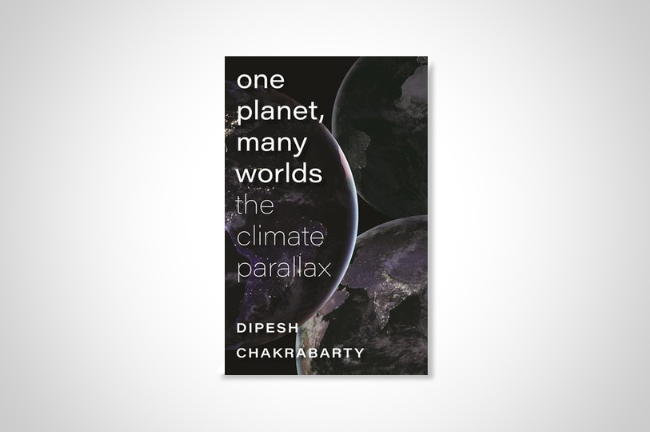You have /5 articles left.
Sign up for a free account or log in.

Brandeis University Press
Dipesh Chakrabarty delivered the Mandel Lectures in the Humanities at Brandeis University in March 2017, parts of which made their way into his book The Climate of History in a Planetary Age (University of Chicago Press, 2021). Other parts have been incorporated into One Planet, Many Worlds: The Climate Parallax (Brandeis University Press), but as now reconsidered in the light of the COVID-19 pandemic. (The author is a professor of history at the University of Chicago.)
Chakrabarty calls the pandemic “inseparable from the planetary environmental problems we face today,” and not just because of the subcultures of denial each has spawned. His approach begins by disassociating three apparently synonymous words. We might call the sphere we live on a planet, a globe or a world, indifferent to the nuances, but the author takes them to signify markedly different concepts.
Let’s start with the contrast between “planet” and “world”—one salient enough to appear in the book’s title. “Planet” refers to the vast diversity and scale of interacting natural elements—atmospheric, oceanic, geological, biological—that have developed over unimaginably large spans of time. The planet is a dynamic system consisting of other dynamic systems—and there is a field called Earth System Science that grapples with the complexity of the relations between the parts and wholes. “The story of the Earth system is also a human-told story,” writes Chakrabarty, “but it does not have humans at its center.”
Humankind is, in fact, an extremely late arrival on the planet, although we’ve made ourselves the axis around which the planet turns, at least in our own eyes. The result has been the emergence of a world. Or, more accurately, “worlds,” for humans have diffused and differentiated themselves in so many directions that the notion of a singular human world seems difficult to credit. We are one species, irrevocably disunited by our own doings. Chakrabarty is a prominent figure in postcolonial historiography, and his thinking about a multiplicity of worlds undoubtedly has overtones of the late-20th-century concept of first-, second- and third-world countries.
Turning finally to the third nonsynonym: he uses “globe” to mean a “500-year-old entity brought into being by humans and their technologies of transport and communication.” Global development went into overdrive with the Great Acceleration, with more than 87 percent of human consumption of fossil fuels in history occurring between the end of World War II and today.
The globe, so understood, is just one variety of human world. But it might be more fitting to think of all the other worlds now existing as being on a planet where global forces predominate.
“The planet is differentiated and yet one,” Chakrabarty writes, to which he also gives a correlative: “Humans are politically not-one.” Our worlds collide, often violently, and no claim to know or express the priorities of universal human well-being will escape suspicion of being a disguised power grab.
This complicates the possibility of dealing with extreme weather changes, pandemics and other ecological crises—not just in the future but as they become undeniable facts of the moment. Their scale is planetary, involving chains of causality across space and time, entangled with the needs and expectations of huge populations that either take the Great Acceleration for granted or crave some version of the lifestyle it made possible.
To recall a familiar episode: according to the prevailing theory, a virus that thrived among bats in one part of the world for countless millennia (seldom if ever replicating itself in another animal) made the leap to one human community, and from it to others, before traveling to every continent within a few months, mutating into hardier forms along the way and killing not quite seven million people in four years. And while vaccines became available in remarkably short order, their global distribution skewed in favor of the accelerated world, where they were nonetheless met with suspicion from large populations.
As yet climate change elicits scarcely a fraction of the sense of urgency that COVID did—and that was after a long experience of ignoring our vulnerability: it marked at least the sixth case since 2003 of the animal-to-human transmission of a pathogen that went pandemic or threatened to do so.
Chakrabarty’s considerations of how human historical memory needs encompass nature are richer and more absorbing than this sketch can convey. Of all the books I’ve discussed here in 2023, One Planet, Many Worlds is the one that I expect to reread in the new year.




